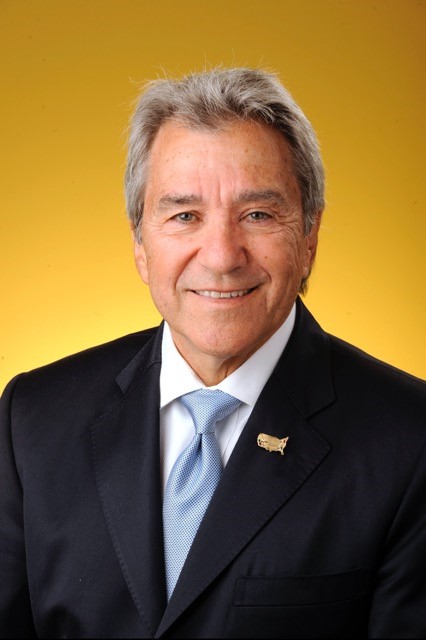STEP INTO THE VALLEY
If you search for the phrase ‘American Dream,’ you’ll probably find a picture of Michael Coles next to it.

MICHAEL COLES
Coming from a self-described “very meager background,” Coles co-founded a business that went on to have nationwide sales of more than $100 million (Great American Cookie Company). He cycled across the United States — twice — after being told he’d never walk again. In the process, he set two transcontinental speed records that still stand today. And he was CEO of Caribou Coffee Company. But if you ask him, those achievements pale in comparison to how he’s been able to give back to his local communities. Jabian sat down with Mr. Coles to learn what makes a great leader, why you shouldn’t be the smartest person in the room, and the real lesson from David and Goliath.
Anytime someone is as successful as you’ve been in business, lessons are learned along the way. What are some of the most important things you’ve learned?
I think part of this lesson was due to starting my business at a young age. I had some successful starts and some not-so-successful starts. But at that age, I thought I had to know all the answers, to be the smartest guy in the room across all facets of the business. And that is just frankly impossible.
I learned the thing to do, if you’re really smart, is surround yourself with very smart people who know a lot about the areas of the business you don’t. That way, you learn from each other and the business prospers. There’s nothing worse than someone in charge who doesn’t know as much about a specific area as the person in charge of the area not listening to that person’s opinion. That is where leadership shows — making the right decision with the correct input.
What about, as a leader, the fear of someone else knowing more than you and threatening your role or position? What would you say to those people?
I think people who are afraid to have others around who are smarter than they are in specific areas lack confidence in their own leadership. A business needs a succession plan, a way to make sure the business continues to prosper once the founder or CEO is gone. You can be a great leader with a vision of where to take the company without being an expert in every area of the business. As that visionary, it’s your job to groom the next leader and make them smarter than you. That’s not threatening. That’s good business.
You’ve spoken a lot about companies that fail to evolve their business models. How do you get all the stakeholders in an organization to believe in a change like that?
One of the real downfalls for many businesses is that leaders at all levels do not communicate well why a product or service is important. Why it’s critical to make a change. Why it’s critical for the future of the company. I talk a lot about perfect execution, which has three points — skill set, tool set, and mind-set.
You can have people with the right skills, and give them the right tools, but if you don’t create the right mind-set and communicate why this is important, it’s going to be nearly impossible to execute. A lot of leaders are really good at the first two, but stumble on the third. The mind-set is the one that costs you the least, but can cost you the most.
The way companies stay relevant is to constantly evolve. They need to ask this question: “If I were to start this same business today, how would I compete against my existing company?” If you ask that question, then no area of the business is sacred. Everything is on the table. That is an important quality of a great leader.
How do we get more businesses involved in their local communities?
I came from a pretty meager background. My mother, when we had nothing, was very involved in baking cookies and cakes for our school or different nonprofit organizations because that’s all we could afford. It wasn’t a lot of cookies or cakes, but it was something, and always with the idea that you have to give back.
That lesson has always stood with me. As corporate citizens to whom much is given, something must be given back. For me, that’s a very important part of my life. As a company, I think you need to stick with the three Ws when getting involved — work, wisdom, and wealth. A lot of organizations write checks, which is great, but giving back means more than just money.
These organizations can benefit greatly from your intelligence, ideas, and support. I think it strengthens your business because people see you leading by example, and it inspires them. There is nothing more important to a business culture than giving back to your local community.
You stress living in the moment and giving each part of your life its full attention. Is that realistic in today’s multitasking world?

When I was cycling, I carried my cell phone, but it was never on. I never pulled over to take a call because that time was important. You can do a lot of clear thinking when you aren’t constantly distracted. I solved a lot of problems on that bike. Today, when I golf or fly fish, two of my hobbies, I never take my phone for the same reason.
That applies to when I’m with my family, too. I will have my phone, but I try really hard not to take calls or check email. And when I’m at work, I try to dedicate everything I have to work. Of course, there are exceptions, and I know some people struggle with separating the two. But a lot of that struggle is self-made. People believe they can’t unplug, but you really can.
The truth is that technology today has been bittersweet. It’s great, but it’s also very invasive. You’ve got to find a way to shut off the phone. It doesn’t have to be for six hours a day, but you’ve got to give yourself a break.
What’s the best advice you’ve been given over the years?
I was on a plane when I was 22 years old. This was before people really used private jets, which I bring up because this experience wouldn’t have happened today. I had been bumped to first class, and the gentleman I was sitting next to definitely would have been flying private today.
We struck up a conversation, and I learned that he was a very successful M&A guy — bought and sold big companies and had done very well for himself. He told me life is about taking risks if you want to be really successful, but take most of your risks when you’re young.
He said the older you get, your life is going to be more and more complicated, and taking risks will become more frightening because you have more to lose. If you take risks when you’re younger, you have time to recover if things go south, and if you succeed, the risks when you’re older won’t be so risky.
One story I like to tell that deals with that advice and with adversity is the story of David and Goliath. The lesson for me is not that David beat Goliath by having good aim against a much bigger, much more armored opponent. The lesson that can be learned from this story, in my mind, is that David had the courage to step into the valley to fight Goliath without knowing what the outcome would be.
Every person, no matter what they do every day, faces Goliath-types of challenges. Whether it’s changing careers, starting a new job, getting in shape, etc. Everyone faces those challenges. The real question people have to ask themselves is whether they have the courage to step into the valley.
